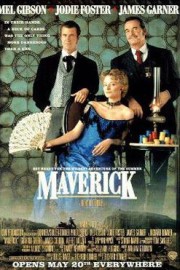Maverick
It’s a credit to the combined forces of William Goldman’s screenplay and Richard Donner’s direction that we are fully engaged in the first half an hour of “Maverick,” which all takes place before the story really kicks into high gear. Yes, we get voiceover by Mel Gibson’s Bret Maverick, and an opening scene of Maverick hanging by a tree branch, with his horse beneath him, in the middle of a desert, but the opening scenes of Maverick are very look while defining not just Maverick as a character, but two other key players in the story to come. This would be deadly in a lot of cases, but because of the playful quality of the writing, the performances, and Donner’s staging of the scenes, we cannot help but enjoy what we’re seeing.
My mother has told me that we watched “E.T. The Extra-Terrestrial” 12 times in theatres; since I was 4-5 at the time, I kind of have to take her word on that. “Maverick,” however, was the first film I saw 10-plus times in theatres as a teenager/adult. This was during my mother’s Mel Gibson crush phase, and so I naturally saw several of his movies a lot with her. I do not regret watching “Maverick” that much, because this film is a pure delight. Among the films Gibson made with Richard Donner, it’s often overshadowed by the “Lethal Weapon” films, and even “Conspiracy Theory,” but this might be the most enjoyable movie they ever made together. Adapted from the 1950s TV show, these two were the right team to bring this character of Bret Maverick to life.
If “Dances With Wolves” and “Unforgiven” and “Tombstone” hadn’t come out in the years prior to “Maverick,” I don’t know that audiences would have been as receptive for a western comedy, even from one of the most successful director-actor pairs at the time. But in the brief time westerns returned to big screen success, having one from the screenwriter of “Butch Cassidy and the Sundance Kid” sure seems like smart money. Adding to that one of the most acclaimed actresses of her generation in a rare comedic roles, and the original Bret Maverick around to keep an eye on things, that was meant for success, and it is, indeed, a winner.
“Butch Cassidy and the Sundance Kid” isn’t the only Redford-Newman pairing to inspire “Maverick,” however; even though he didn’t write “The Sting,” “Maverick” also features a series of double crosses and cons that will help Bret (Gibson) get to the $25k he needs for a big riverboat poker tournament, where the winner gets half a million dollars. He just needs to be able to hold on to it, less Annabelle Bransford (Jodie Foster) or Angel (Alfred Molina) get their hands on it, or he gets himself killed through the inaction of lawman Zane Cooper (James Garner, who played Maverick on TV). Along the way, he finds himself in the middle of a bank robbery from a familiar face; recovering money and possessions for a missionary wagon train allegedly robbed by indians; then going off with a tribe of indians himself led by an old friend. As you probably can guess, he does get to the game, and that isn’t even the end of his problems.
Given his personal faults that have been revealed in the past 15 years, it’s easy to dismiss Gibson as a screen presence now. If you watch his pre-“Passion of the Christ” films, though, you’ll witness not only one of the most charismatic movie stars of the era, but maybe the most underrated actor of the bunch. Bret Maverick fits him like a glove, and he’s matched by every actor he goes up against here, from James Coburn as Commodore Duvall and Graham Green as Joseph (in a role far removed from his noble performance in “Dances With Wolves”) to even smaller roles like Geoffrey Lewis (who runs the bank that gets held up) and Max Perlich as Johnny Hardin, one of the poker players at the beginning of the film. As Angel, this is a great role for Molina who plays a grizzled desperado whom can go toe-to-toe with Gibson’s Maverick convincingly in brute strength and intelligence. As Coop, Garner is a wily one, and it’s easy to see why we believe some of the most ridiculous turns the character seems to take in terms of his relationships with certain characters. Foster is as good as she’s ever been as Annabelle, using her personality and beauty as a weapon against Maverick at some times, while also allowing us to see why these two form a connection, as well- how has no one else really utilized the obvious comedic talent she has since “Maverick?” Meanwhile, Gibson was a born movie star, and Maverick might be some of the most fun he’s ever had playing a character; he’s not a good human being, but a movie star he was, in every sense of the word.
Cinematographer Vilmos Zsigmond shoots this with a great eye for the landscape, and close-ups when needed, and Randy Newman’s score is a delight from the composer. Richard Donner wanted to do “Maverick” because it was one show he had never had the opportunity to direct when he was doing TV. He knocks it out of the park, and made a winner.










